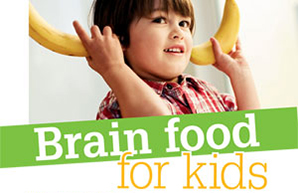Most of us know the importance of starting our child’s school day with a good breakfast for energy. But by including specific nutrients in this and other meals, some researchers believe we can go further, improving their concentration, brain functioning and development. ‘Behaviour and academic performance are significantly affected by the quantity and quality of the foods we give children during the school years,’ says paediatrician Dr Alan Greene, author of Raising Baby Green (Jossey-Bass).
‘The brain is essentially made from the food we eat,’ adds Patrick Holford, director of the Food for the Brain Foundation and Brain Bio Centre in London and author of Optimum Nutrition for Your Child’s Mind (Piatkus). ‘You really can change how your child thinks, feels and behaves by changing what goes into his or her mouth.’
While not going that far, Port Elizabeth dietician René Smalberger, president of the Association of Dietetics in South Africa, says there is ‘growing scientific evidence’ that some foods such as omega-3 have ‘an important role in brain development, concentration, and improvingmemory recall.’
So what should you feed your child?
Omega-3s: Healthy brains are about 60 percent structural fat, says Greene, and the most prevalent structural fat in the brain is DHA, an omega-3 fatty acid. ‘Studies have suggested that DHA levels are associated with problems with intelligence, vision and behaviour,’ he says. Serve your child DHA-rich oily fish (pilchards, salmon, tuna, mackerel and sardines) at least twice a week. ‘This could easily be done by making fishcakes from pilchards, or even a fish spread,’ says Smalberger. Sprinkle soups, stews or cereals with raw nuts (especially walnuts and almonds) and seeds (flax, pumpkin or sesame) powdered in a coffee grinder for better absorption.
Choline: A crucial nutrient for brain development and memory, choline is found in nuts and egg yolk. You can give children up to four eggs a week.
Protein: This provides the amino acids from which neurotransmitters are made. Give children small servings of chicken, fish or lean red meat (grilled, steamed, baked or poached). Up their intake of healthy high-fibre plant proteins – add dried beans, lentils, soya, tofu or quinoa to soups, stews and sandwich fillings.
Iron: This trace element is vital for healthy brain tissue and neurotransmitter functioning. Studies have shown that when students’ iron levels increase, they concentrate and learn better. Lean beef is a potent source and has zinc to aid memory, but restrict red meat to two or three times a week. Other sources of iron include eggs, dried fruits (especially raisins), whole grains, nuts, green leafy veggies, seeds and pulses.
Complex carbs: The brain requires a steady supply of glucose throughout the day, and eating unrefined carbs supplies this. Give wholemeal bread, brown rice and raw oats, and team complex carbs with proteins for extra punch.
Calcium: This is important to grow brains as well as bones, and to conduct nerve impulses. Found in dairy produce, along with protein and B vitamins.
Vitamin B12: Needed for maintaining healthy myelin, the tissue covering and insulating nerves. Best sources are meat, eggs and dairy products.
Antioxidants: Vitamin C is needed to make neurotransmitters, and antioxidants in general are believed to boost memory and keep brain cells strong. Serve kids a variety of salads, vegetables and fruits – the more colourful the better. Current dietary guidelines are at least five servings a day, a serving being the size of the child’s fist.
Fibre: The soluble variety in oats and fruit pectin helps lower the glycemic index of foods, stabilising blood sugar and improving brain functioning.
Brain-building meal ideas
Breakfast
- Oats porridge with low-fat milk, fresh fruit and ground raw seeds and nuts
- Boiled, poached or scrambled eggs with wholemeal toast
- Peanut butter or baked beans on wholemeal toast
- Smoothie made of yoghurt, fresh fruit, seeds and nuts
Lunch
- Wholemeal sandwiches or pita pockets filled with salad and low-fat cheese, chicken, lean meat or peanut butter, plus a fruit
- Small tub of hummus, chopped raw veggies for dipping, wholewheat biscuits or oatcakes
- Water (add a slice or two of citrus for zing) or diluted fruit juice – hydration is vital for proper brain functioning
After-school snack
- Bowl of fortified cereal with low-fat milk and fruit
- Wholemeal sandwich and low-fat milk
Supper
Grilled chicken, fish, lean beef or soya wholewheat burger with salad
Homemade veggie and mozzarella pizza on wholewheat pita base
Vegetable and pulse soup or stew
Yoghurt with baked or fresh fruit for dessert
To supplement or not?
Picky eaters can benefit from a daily multivitamin containing the recommended dietary allowance (RDA) of essential vitamins and minerals. ‘If they are not consuming fatty fish twice a week, an omega-3 supplement could also be added,' says Smalberger. Studies have shown these can improve school performance, but studies using megavitamin doses showed no benefits. (Excess water-soluble vitamins like C are excreted, fat-soluble ones like A can build up and be toxic.) Vegan children may need B complex vitamins and iron but it’s best to ask your doctor or a dietician for advice.

